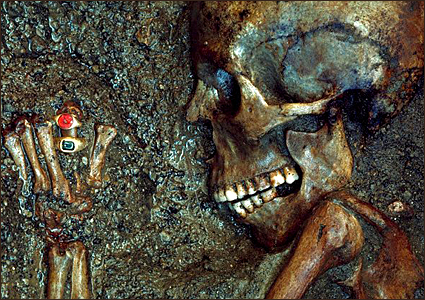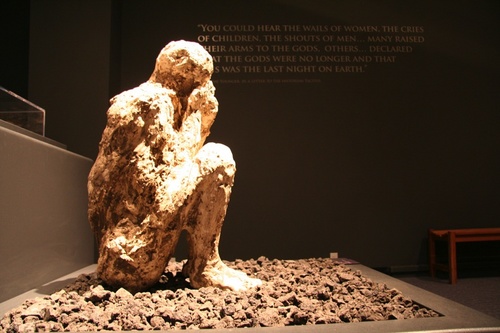|

http://dsc.discovery.com/convergence/pompeii/history/history.html

The image above is of a preserved body of a man resting his back along
a wall as he was buried under volcanic ash.
Welcome to Ancient Pompeii, My name is Lupercus and I am a resident
of this city. To help you understand how my city was years ago, please close your eyes and imagine the city and yourself 2,000
years ago, in the year 79 A.D. All was well in Pompeii. The town was full of 20,000 happy citizens going about there everyday
lives. Pompeii was a beautiful city that had running water, public bathrooms, cobblestone streets, and a growing marketplace.
In the marketplace a citizen could buy almost anything they desired. Inside all the homes you would find magnificent works
of art, and a refeverences of local gods and goddesses, and always smell the sweet scent of honey donuts baking in the oven.
Ancient Pompeii was a port city located on the blue waters of the Bay of Naples. There were many foreigners and travelers
that came through Pompeii and provided us with goods from several other lands.
Now, stop and think of how great Ancient Pompeii truly sounded.
But, now picture the date of August 24th, the sky was dark and cloudy, the grounds were shaking from small sized earthquakes.
We were so used to small earthquakes, residents didn't think they were in any danger. Until, Mount Vesuvius, the volcano that
overshadows the city of Pompeii, erupted and shot burning ashes of lava everywhere. The citizens were in a state of shock
as well as I was too. Everyone was running around crazy. You heard screams and crys of people dying. Several resident's fled
the land, but some just stayed locked inside there homes, hoping it would protect them from the burning lava, floating through
the lands.
When you walk through my city, what you see
could possibly shock you or it could fascinate you . That will be for your choosing. The lava covered up buildings, houses,
including all the remaining citizens in Ancient Pompeii. Whether they were adult pompeiians or children or even an animal,
there was nothing left of anything. But what the eruption left behind was a town literally frozen in time. To all of you they
will look like sculptures or statues to the eyes. Instead of an actual human being under all the plaster-cast.(dry lava). But,
for now this is where I shall leave you. Enjoy your tour of Ancient Pompeii.

A layout of The Bay of Naples and the surrounding cities around
Pompeii and the volcano.
https://www.angelfire.com/ca/celiahome/discovered.html
Timeline
Aug. 24, A.D. 79
1 p.m.: When the people of Herculaneum saw a column
of smoke bursting from Vesuvius, reaching nine miles into the sky, they looked around, astonished. As the first ash fell on
the roofs of their houses, they understood it was time to run. Most stopped to gather what belongings they could: money, jewels,
the family dog. Everybody rushed into the streets. Some thought the sea was their route to safety; those who didn't try to
escape on boats assembled on the beach.
Midnight: The cloud reached almost 19 miles into the
sky, and torrents of lava poured down Vesuvius. The beach probably offered a spectacular view of the eruption, but the fugitives
didn't live much longer to admire it.
Aug. 25, A.D. 79
1 a.m.: A cloud of gas and ash plunged down on the
town; the hot breath of Vesuvius killed the fugitives in a fraction of a second. By studying bone fractures and the position
of the remains, anthropologist Paolo Petrone and volcanologist Giuseppe Mastrolorenzo established beyond a doubt that the
fugitives were wrapped in a 900-degree Fahrenheit cloud. They died instantly of thermal shock, not from slow suffocation as
scientists long assumed.
1 to 6 a.m.: More surges followed.
7 a.m.: A devastating surge killed the remaining inhabitants
of Pompeii; they lay down with death on a thick carpet of pumice.
8 a.m.: Silence fell on Herculaneum and Pompeii.
You can find this timeline at www.discovery.com
|

